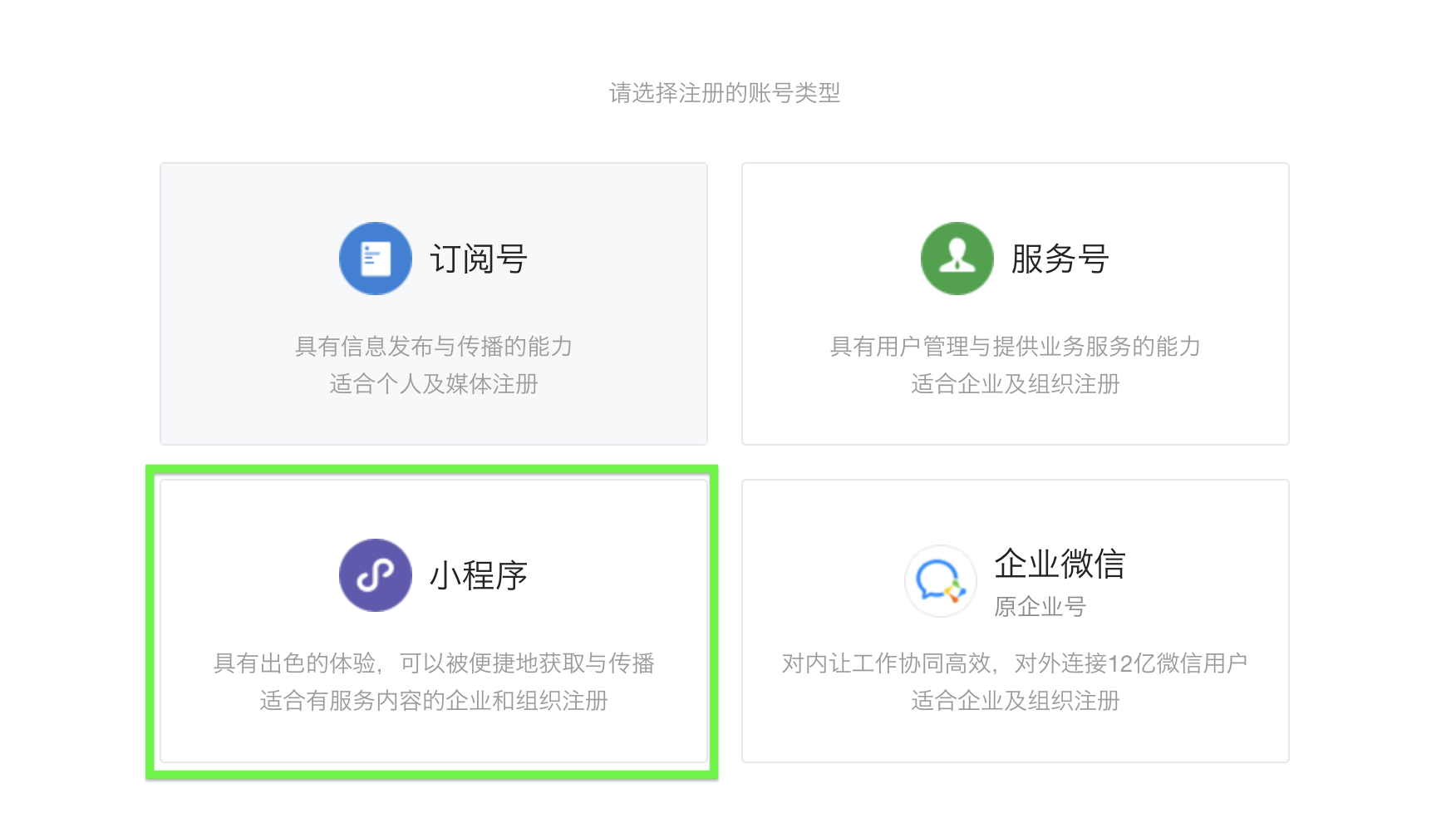使用若依写微信小程序登录授权认证接口(365)
本文教程,主要介绍一下,如何利用若依框架完成微信小程序的登录授权整个流程。
一、注册微信小程序账号
微信小程序官方注册地址:
https://mp.weixin.qq.com/cgi-bin/registermidpage?action=index&lang=zh_CN&token=

注:邮箱填写未被微信公众平台注册,未被微信开放平台注册,未被个人微信号绑定的邮箱
二、获取AppID和AppSecret

AppSecret初次没有,需要先扫进行扫码之后生成,之后记得保存下来(如果忘记了,只有重置AppSecret)
拿到AppID和AppSecret之后,我们就可以去看下微信小程序官方给我提供的接口文档。\
三、微信小程序授权登录流程
https://developers.weixin.qq.com/miniprogram/dev/framework/open-ability/login.html
微信小程序登录流程图:

第一步:调用 wx.login() 获取 临时登录凭证code ,并回传到开发者服务器。
wx.login({
success (res) {
if (res.code) {
//发起网络请求
wx.request({
url: 'https://example.com/onLogin',
data: {
code: res.code
}
})
} else {
console.log('登录失败!' + res.errMsg)
}
}
})
第二步:调用 auth.code2Session 接口,换取 用户唯一标识 OpenID 、 用户在微信开放平台帐号下的唯一标识UnionID(若当前小程序已绑定到微信开放平台帐号) 和 会话密钥 session_key。

这里就需要我们为微信小程序写一个授权接口了,前端给我传入一个code参数,然后通过我们写的接口调用官方给我提供的授权接口,填写我们appid和secret及code参数。
四、编写微信小程序登录授权接口
这里我们利用若依开源框架(不分离版本)基础上编写微信小程序登录授权接口。
若依文档地址:http://doc.ruoyi.vip/
若依项目地址:https://gitee.com/y_project/RuoYi
不会启动若依开源项目的小伙伴,可以参考我之前写的若依系列:
若依中用到的第三方依赖工具包:
<dependencies>
<!-- 通用工具-->
<dependency>
<groupId>com.ruoyi</groupId>
<artifactId>ruoyi-common</artifactId>
</dependency>
<!--hutool工具类-->
<dependency>
<groupId>cn.hutool</groupId>
<artifactId>hutool-all</artifactId>
<version>5.7.19</version>
</dependency>
</dependencies>
JAVA接口代码
package com.ruoyi.wechat.controller;
import cn.hutool.core.util.StrUtil;
import cn.hutool.json.JSONObject;
import cn.hutool.json.JSONUtil;
import com.ruoyi.common.core.domain.AjaxResult;
import com.ruoyi.common.utils.http.HttpUtils;
import org.springframework.web.bind.annotation.GetMapping;
import org.springframework.web.bind.annotation.RequestMapping;
import org.springframework.web.bind.annotation.RestController;
import java.util.HashMap;
import java.util.Map;
import java.util.UUID;
/**
* 微信小程序授权接口
*/
@RestController
@RequestMapping("/api")
public class WechatController {
/**
* 微信小程序AppID
*/
private final static String AppID = "填写你的小程序AppID";
/**
* 微信小程序AppSecret
*/
private final static String AppSecret = "填写你的小程序AppSecret ";
/**
* @param code 登录时获取的 code
* @return
*/
@GetMapping("/wxlogin")
public AjaxResult getWechatLoginInfo(String code) {
String url = "https://api.weixin.qq.com/sns/jscode2session";
String params = StrUtil.format("appid={}&secret={}&js_code={}&grant_type=authorization_code", AppID, AppSecret, code);
String json = HttpUtils.sendGet(url, params);
JSONObject jsonObject = JSONUtil.parseObj(json);
String session_key = (String) jsonObject.get("session_key");
String openid = (String) jsonObject.get("openid");
if (StrUtil.isEmpty(openid)) {
return AjaxResult.error("未获取到openid");
}
String token = UUID.randomUUID().toString();
Map<String, Object> data = new HashMap<>();
data.put("token", token);
data.put("session_key", session_key);
data.put("openid", openid);
return AjaxResult.success(data);
}
}
五、编写简单微信小程序登录页面
index.wxml
<!--index.wxml-->
<view class="container">
<view>
<button open-type="getUserInfo" bind:tap="login" type="default">微信授权登录</button>
</view>
</view>
index.js
login(evt) {
wx.getUserProfile({
desc: '登录', //描述信息
success: res => {
// console.log(res); 成功回调
if (res.userInfo) {
wx.login({
success: ret => {
// console.log(ret);
var code = ret.code
wx.request({
url: 'http://localhost/api/wxlogin', //仅为示例,并非真实的接口地址
data: {
code: code
},
success(res) {
console.log(res.data)
if (res.data.code == 0) {
console.log("登录成功");
wx.setStorageSync('token', res.data.data.token);
wx.setStorageSync('openid', res.data.data.openid);
wx.setStorageSync('session_key', res.data.data.session_key);
wx.navigateTo({
url: '/pages/hello/hello',
})
}else{
console.log("登录失败");
}
}
})
}
})
}
}
})
}
hello.wxml
<!--pages/hello/hello.wxml-->
<text>登录成功</text>
注:本地测试接口的时候,需要选择不校验合法域名以及https证书

六、测试微信授权登录接口

可以看到,我们已经成功的完成了微信小程序的授权登录。本文只是做一个简单的入门教程。